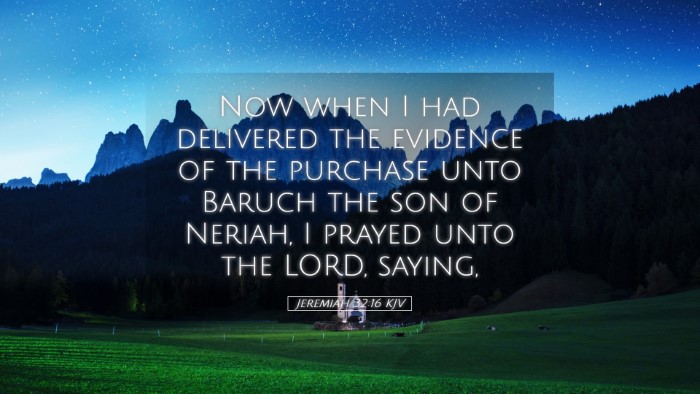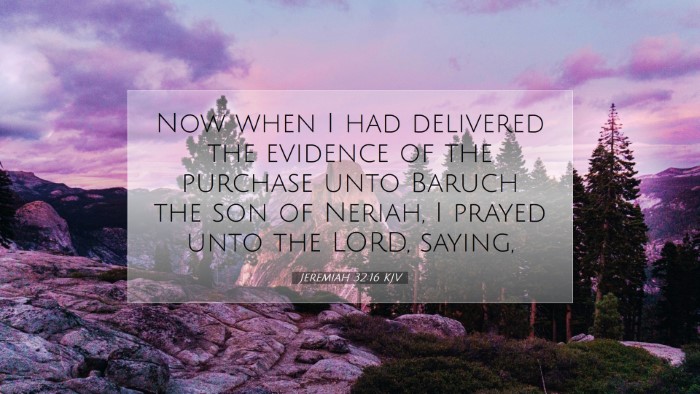Commentary on Jeremiah 32:16
Jeremiah 32:16: "Now when I had delivered the evidence of the purchase unto Baruch the son of Neriah, I prayed unto the LORD, saying,"
Introduction
Jeremiah 32:16 is a pivotal verse in understanding the prophetic ministry of Jeremiah and the demonstration of faith amid dire circumstances. As he is tasked with purchasing a field in Anathoth during a time of impending destruction and exile, his actions and subsequent prayer reflect both his trust in God’s promises and the socio-political turmoil of Israel.
Historical Context
The context of Jeremiah’s purchase is crucial. At this time, Jerusalem is under siege by the Babylonian army. The prophet Jeremiah, acting upon God’s instruction, buys a field as a sign of faith in God’s promise to restore Israel after their exile. This purchase is emblematic of hope in a seemingly hopeless situation.
Insights from Commentaries
Matthew Henry
Matthew Henry highlights the significance of the act of purchasing the field. He notes that Jeremiah’s action was contrary to natural reasoning, as it appeared to be a foolish investment given that the land was about to be overrun by the enemy. However, Henry points out that Jeremiah’s obedience to God's command reflects a profound faith. He emphasizes that the transaction was a symbolic act demonstrating that God’s plans for Israel extend beyond their current despair. The prayer following the purchase indicates Jeremiah’s reliance on God for guidance and understanding.
Albert Barnes
Albert Barnes offers a theological perspective, illustrating that through Jeremiah's prayer, believers can discern the connection between faith and prayer. Barnes insists that true prayer flows from a heart that trusts in God's promises. He stresses the importance of recognizing God's sovereignty even amidst adversity. This prayer, following an act of faith, serves as a model for believers to follow; it shows the vital role of prayer in acknowledging God’s providence and strength in times of trial.
Adam Clarke
Adam Clarke focuses on the character of Baruch, the scribe, who received the deed of the purchase. Clarke draws attention to the significance of Baruch's role as a faithful minister to Jeremiah. He suggests that in times of trial, God raises faithful individuals to support His servants. Clarke also interprets Jeremiah's prayer as one that reflects humble supplication and recognition of God's omnipotence, highlighting the proper attitude one ought to maintain when approaching God in prayer.
Theological Implications
This verse invites reflection on several theological themes: the nature of faith in action, the role of prayer in the believer's life, and God's promise of restoration. As Jeremiah acts obediently, he illustrates a profound understanding of God’s covenantal promises, which assure the restoration of Israel. His prayer serves as a reminder for present-day believers to maintain an active faith that is expressed through obedience to God’s word.
Application for Today
For pastors, students, theologians, and Bible scholars, Jeremiah 32:16 offers rich layers of application:
- Faith Under Pressure: Like Jeremiah, modern believers are called to exhibit faith in challenging circumstances. This encourages a posture of trust amidst uncertainty.
- The Importance of Prayer: Jeremiah's prayer emphasizes the necessity of communication with God, particularly when undertaking significant actions that affect ministry and personal life.
- Hope in Despair: The act of purchasing land symbolizes hope in God's promises, teaching that faith should perceive beyond present difficulties to the eventual fulfillment of divine plans.
- Support in Ministry: Baruch’s support of Jeremiah reminds church leaders of the importance of fellowship and encouragement within the body of Christ.
Conclusion
Jeremiah 32:16 encapsulates the themes of faith, prayer, and hope in God’s faithfulness. As seen through the insights of Matthew Henry, Albert Barnes, and Adam Clarke, this passage serves not only as a historical account but as a theological foundation that encourages believers to trust in God's unfailing promises. The challenge for today’s believers is to embody this faith in action, approaching God with fervent prayer and enduring hope even in times of trial.


